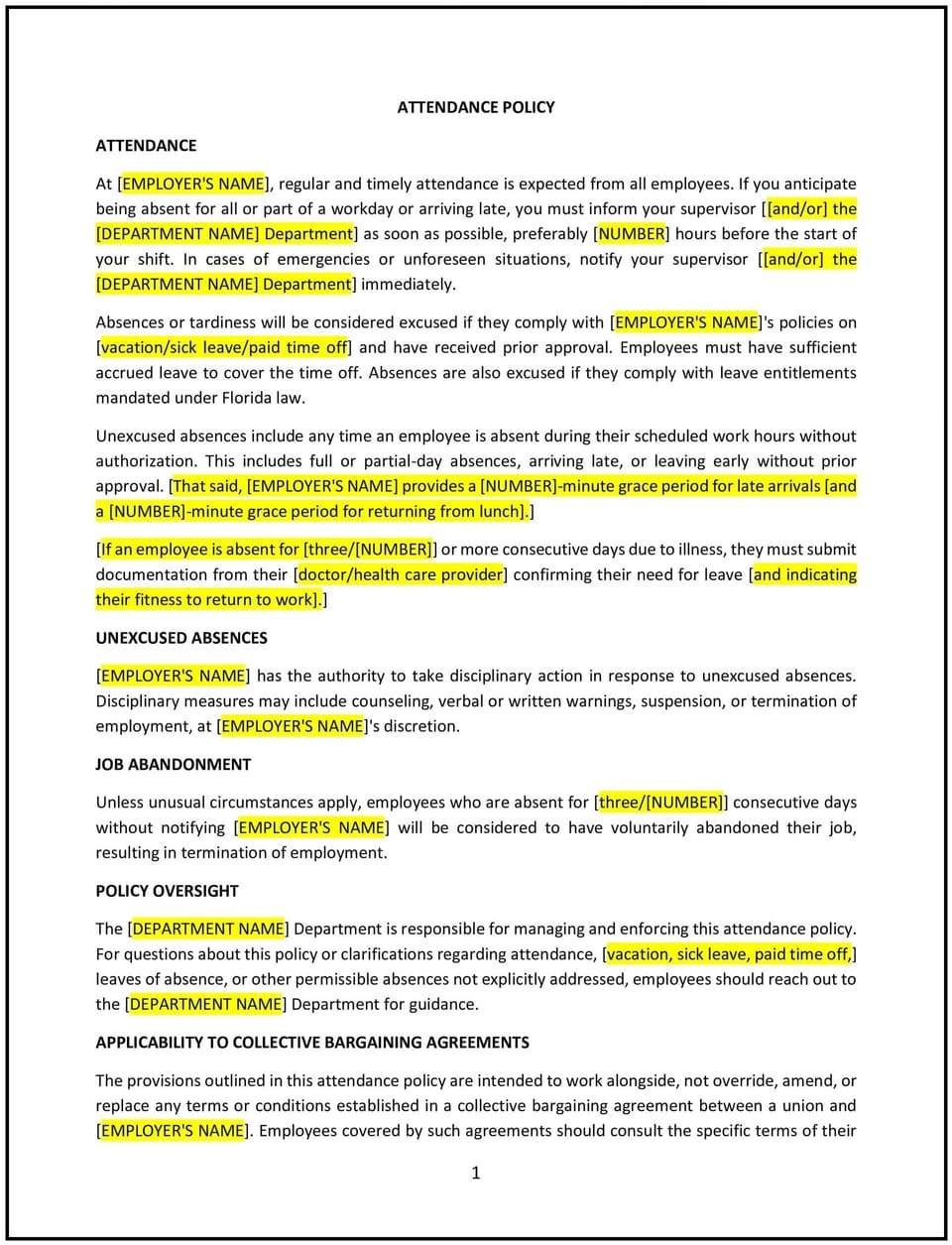Attendance policy (Florida): Free template

Attendance policy (Florida)
An attendance policy helps Florida businesses establish clear expectations for employee punctuality, presence, and time management. This policy outlines procedures for tracking attendance, addressing absences, and maintaining operational efficiency. It is designed to promote accountability, reduce disruptions, and provide a framework for managing attendance-related issues in a fair and consistent manner.
By implementing this policy, businesses in Florida can improve productivity, demonstrate their commitment to operational excellence, and align with the state’s focus on fostering reliable and efficient workplaces.
How to use this attendance policy (Florida)
- Define attendance expectations: Clearly specify work hours, punctuality requirements, and procedures for requesting time off.
- Establish absence protocols: Outline how employees should notify the business of absences or tardiness, including notice requirements and documentation.
- Address patterns of absenteeism: Explain how the business will handle repeated or unexcused absences, including potential consequences.
- Provide flexibility options: Include guidelines for accommodating reasonable requests, such as flexible schedules or remote work arrangements.
- Communicate the policy: Share the policy with employees during onboarding and through regular communications to ensure awareness and understanding.
- Monitor adherence: Regularly review attendance records and address any concerns or discrepancies promptly.
- Update the policy: Periodically assess the policy to reflect changes in workplace dynamics, operational needs, or business goals.
Benefits of using this attendance policy (Florida)
This policy offers several advantages for Florida businesses:
- Promotes accountability: Clear guidelines help employees understand their responsibilities regarding punctuality and presence.
- Reduces disruptions: Defined procedures minimize the impact of absences on operations and team performance.
- Supports fairness: A consistent policy ensures that all employees are treated equally when it comes to attendance matters.
- Enhances productivity: Reliable attendance contributes to smoother workflows and improved business outcomes.
- Builds trust: Transparent policies demonstrate the business’s commitment to fairness and operational excellence.
- Aligns with local values: Reflects Florida’s emphasis on reliability, efficiency, and mutual respect in the workplace.
- Improves planning: Helps businesses anticipate staffing needs and manage schedules effectively.
Tips for using this attendance policy (Florida)
- Communicate clearly: Ensure employees understand the policy by providing written materials and discussing it during meetings or training sessions.
- Train managers: Educate supervisors on how to enforce the policy consistently and fairly while addressing individual circumstances.
- Be flexible: Allow for reasonable accommodations, such as medical leave or family emergencies, to support employees when needed.
- Track attendance: Maintain accurate records of employee attendance to identify trends and address issues proactively.
- Stay informed: Keep up with changes in labor laws or regulations that may affect attendance policies or practices.
- Encourage feedback: Solicit input from employees to identify areas for improvement and ensure the policy meets their needs.
- Review periodically: Assess the policy’s effectiveness and make updates as needed to reflect changes in workplace dynamics or business goals.
Q: Why should Florida businesses adopt an attendance policy?
A: Businesses should adopt this policy to promote accountability, reduce disruptions, and maintain operational efficiency in the workplace.
Q: What types of absences should be addressed in the policy?
A: Businesses should include guidelines for handling excused absences, such as medical leave or family emergencies, as well as unexcused absences or tardiness.
Q: How should businesses handle repeated absences?
A: Businesses should document patterns of absenteeism, communicate with the employee to understand the cause, and apply consequences consistently based on the policy.
Q: What flexibility options should businesses consider?
A: Businesses should consider offering flexible schedules, remote work arrangements, or other accommodations to support employees while maintaining operational needs.
Q: How can businesses track attendance effectively?
A: Businesses should use tools like time-tracking software, attendance logs, or scheduling systems to monitor employee punctuality and presence consistently.
Q: Should businesses require documentation for absences?
A: Businesses should request reasonable documentation, such as doctor’s notes or official notices, for excused absences to verify their legitimacy.
Q: How often should businesses review the policy?
A: Businesses should review the policy annually or whenever there are significant changes in workplace dynamics, operational needs, or business goals.
This article contains general legal information and does not contain legal advice. Cobrief is not a law firm or a substitute for an attorney or law firm. The law is complex and changes often. For legal advice, please ask a lawyer.


